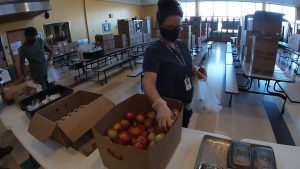Brooklyn Center Elementary Rolls Out Farm to School Initiative
In a normal school year, the cafeteria at Brooklyn Center Elementary School would be packed with students. But instead of children, it’s filled with boxes and a handful of kitchen staff.
Yet those kitchen employees are hard at work to ensure that during the pandemic, the kids are still getting healthy food.
“Every day we try and give them fresh fruits and vegetables, and we also have some spaghetti here that was homemade by our cook, Stacy,” said Leah Bucko, a cook helper with Brooklyn Center Community Schools.
Monday through Friday, Bucko and her coworkers form an assembly line where they pack about 200 lunches.
Some students come to the building to pick up the meals, and others have them delivered to their respective bus stops.
“We started it back in March when the pandemic started, and we went all through summer,” Bucko said. “Usually they don’t provide food for the people in the summer, but because of the pandemic, we decided to do that just to help people out.”
It’s all part of the Brooklyn Center Community Schools’ Farm to School initiative.
“It’s really a program to help encourage kids to eat healthier, understand where their food comes from, and also to support our local farmers while we’re at it,” said Megan Grubb, the district’s Farm to School coordinator.

Leah Bucko, who works in the kitchen at Brooklyn Center Elementary School, helps to pack bag lunches for students.
Trying new, healthy food
Grubb says one of the goals of the Farm to School program is to serve students food that they might not always get at home.
“We’ve done things like roasted chestnuts, or kind of exotic Minnesota fruits like honey berries or kiwi berries to really promote adventurous eating,” she said.
And in a year when COVID-19 isn’t a factor, Grubb would be doing things like helping students learn about gardening in the school garden.
“At some point all the students will have an opportunity to come out here,” Grubb said, while standing in the school garden. “And they do various things like they’ll plant seeds at the beginning of the year. They’ll harvest. They’ll do taste tests out in the garden so they’ll taste fresh radishes or strawberries.”
Yet with most of the students doing distance learning, those hands-on activities have temporarily been put on hold.
“We’ve clearly had to shift a lot in the last year,” Grubb said.
However, the Farm to School program still lives on. One day, the students will eventually get back in the garden, or go on field trips to local farms.
But for now, district leaders will implement the Farm to School program by providing students with fresh, locally-sourced produce in their bag lunches.
“We get a lot of return customers every day,” Bucko said. “And we get to learn their names and what they want and what they like and everything, and they seem really appreciative. So it feels good.”


